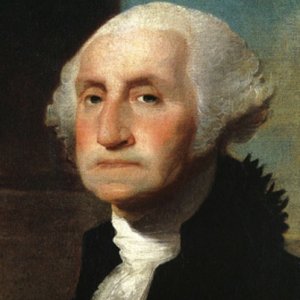SifuPhil
R.I.P. With Us In Spirit Only
- Location
- Pennsylvania, USA
Easy one, right?
Good ol' Georgie-Boy Washington!

But if you said that, you'd be wrong. In fact, George didn't take office until April 30, 1789, while the United States declared its independence in 1776.
So who ran the country for those initial years?
The first eight Presidents.
John Hanson was the very first President. The new country was actually formed on March 1, 1781 with the adoption of The Articles of Confederation. This document was actually proposed on June 11, 1776, but not agreed upon by Congress until November 15,1777.
Maryland refused to sign this document until Virginia and New York ceded their western lands (Maryland was afraid that these states would gain too much power in the new government from such large amounts of land).
Once the signing took place in 1781, a President was needed to run the country.
John Hanson was chosen unanimously by Congress (which included George Washington). In fact, all the other potential candidates refused to run against him, as he was a major player in the revolution and an extremely influential member of Congress.
Hanson, as President, ordered all foreign troops off American soil, as well as the removal of all foreign flags. This was quite the feat, considering the fact that so many European countries had a stake in the United States since the days following Columbus.
Hanson established the Great Seal of the United States, which all Presidents have since been required to use on all official documents. President Hanson also established the first Treasury Department, the first Secretary of War, and the first Foreign Affairs Department. Lastly, he declared that the fourth Thursday of every November was to be Thanksgiving Day, which is still true today.
The Articles of Confederation only allowed a President to serve a one year term during any three year period, so Hanson actually accomplished quite a bit in such little time.
Seven other presidents were elected after him — Elias Boudinot (1782-83), Thomas Mifflin (1783-84), Richard Henry Lee (1784-85), John Hancock (1785-86), Nathan Gorman (1786-87), Arthur St. Clair (1787-88), and Cyrus Griffin (1788-89) — all prior to Washington taking office.
So what happened? Why don't we hear about the first eight presidents?
It's quite simple — The Articles of Confederation didn't work well. The individual states had too much power and nothing could be agreed upon. A new doctrine needed to be written — something we know as the Constitution.
And that leads us to the end of our story.
George Washington was definitely not the first President of the United States. He was the first President of the United States under the Constitution we follow today.
And the first eight Presidents are forgotten in history.
Good ol' Georgie-Boy Washington!

But if you said that, you'd be wrong. In fact, George didn't take office until April 30, 1789, while the United States declared its independence in 1776.
So who ran the country for those initial years?
The first eight Presidents.
John Hanson was the very first President. The new country was actually formed on March 1, 1781 with the adoption of The Articles of Confederation. This document was actually proposed on June 11, 1776, but not agreed upon by Congress until November 15,1777.
Maryland refused to sign this document until Virginia and New York ceded their western lands (Maryland was afraid that these states would gain too much power in the new government from such large amounts of land).
Once the signing took place in 1781, a President was needed to run the country.
John Hanson was chosen unanimously by Congress (which included George Washington). In fact, all the other potential candidates refused to run against him, as he was a major player in the revolution and an extremely influential member of Congress.
Hanson, as President, ordered all foreign troops off American soil, as well as the removal of all foreign flags. This was quite the feat, considering the fact that so many European countries had a stake in the United States since the days following Columbus.
Hanson established the Great Seal of the United States, which all Presidents have since been required to use on all official documents. President Hanson also established the first Treasury Department, the first Secretary of War, and the first Foreign Affairs Department. Lastly, he declared that the fourth Thursday of every November was to be Thanksgiving Day, which is still true today.
The Articles of Confederation only allowed a President to serve a one year term during any three year period, so Hanson actually accomplished quite a bit in such little time.
Seven other presidents were elected after him — Elias Boudinot (1782-83), Thomas Mifflin (1783-84), Richard Henry Lee (1784-85), John Hancock (1785-86), Nathan Gorman (1786-87), Arthur St. Clair (1787-88), and Cyrus Griffin (1788-89) — all prior to Washington taking office.
So what happened? Why don't we hear about the first eight presidents?
It's quite simple — The Articles of Confederation didn't work well. The individual states had too much power and nothing could be agreed upon. A new doctrine needed to be written — something we know as the Constitution.
And that leads us to the end of our story.
George Washington was definitely not the first President of the United States. He was the first President of the United States under the Constitution we follow today.
And the first eight Presidents are forgotten in history.



